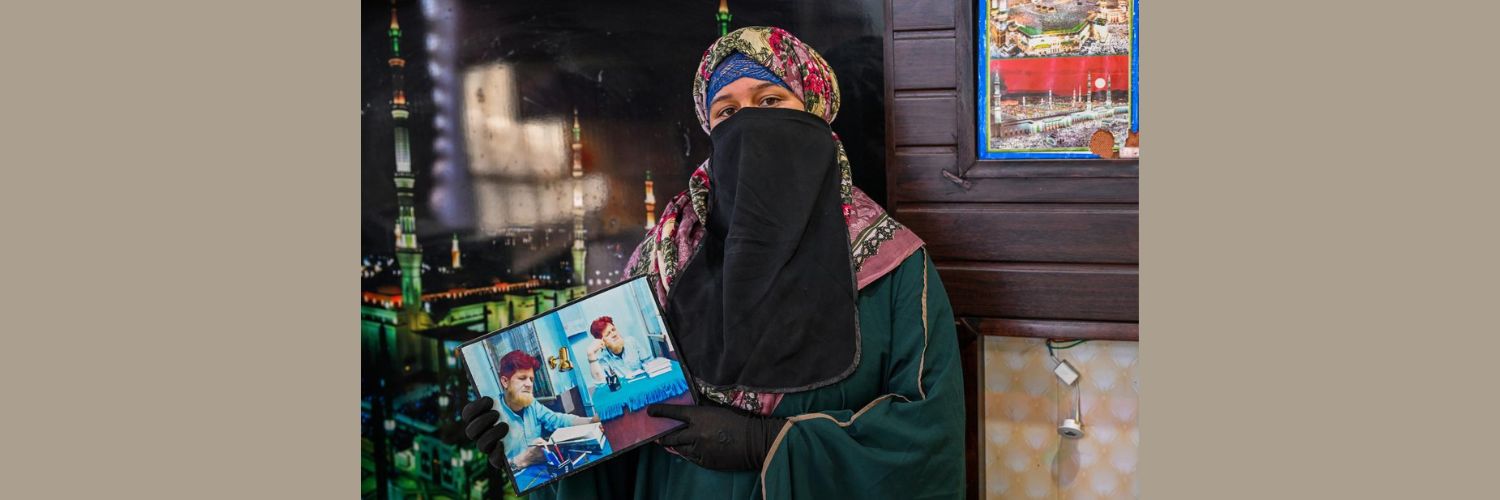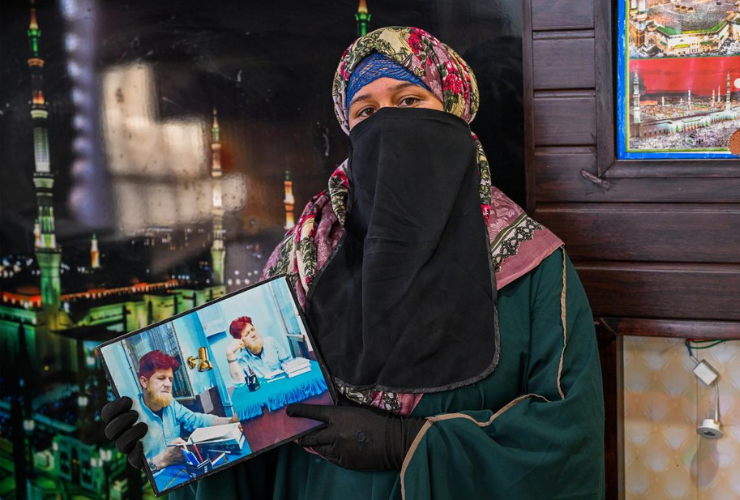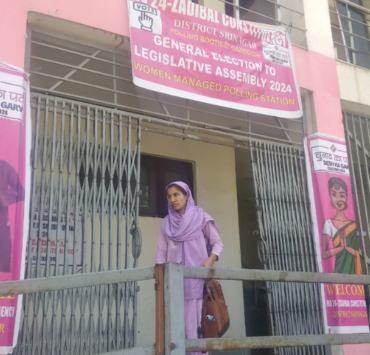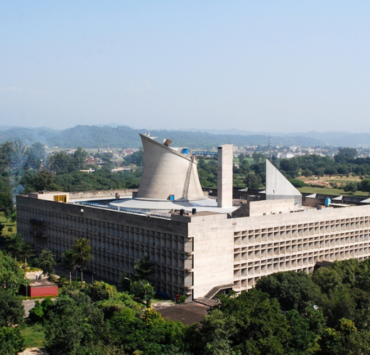
By Safeena Wani

Sugra Barkati. Photo courtesy: Imran Nissar/ The Hindu
A group of bandana-clad boys chaperone Sugra Barkati, a barely 16-year-old youngster, to Ganderbal constituency, one of the 90 constituencies in Jammu and Kashmir, which will decide the fate of former chief minister Omar Abdullah, and jailed cleric Sarjan Barkati, who became the face of the pro-Burhan Wani protests in 2016. Burhan, a leader of the Hizbul Mujahideen, was killed in a firefight in July 2016.
Both Abdullah and Barkati are locking horns over Ganderbal constituency in the ongoing assembly polls in Jammu and Kashmir, which is being held after a decade.
Although Abdullah has a clear advantage in this electoral battle, Barkati is riding on his daughter Sugra’s emotional campaign.
Sugra is a quintessential abaya-clad, face-covered Kashmiri woman who is speaking about the oppression of her community and clan for securing a seat in the assembly for her father. Her vocal campaign is already making inroads in Kashmir’s thawing political landscape.
Her campaign, however, was not a cakewalk right from the beginning. When she recently filed a nomination on her father’s behalf in Wachi constituency of Shopian in south Kashmir, it was rejected. “I was told the form was incomplete. Shopian is our hometown. And the rejection rattled me,” she says.
But the class 10 student, who became her father’s campaigner quite early in her life, decided to fight back after an initial breakdown. Along with her sibling in class five, she fuelled the electoral campaign of her father and, eventually, made the authorities accept Sarjan Barkati’s nominations from Ganderbal and Beerwah seats in central Kashmir.
“I told my people that they should help our cause because we siblings are living like orphans,” says Sugra. “They didn’t disappoint us.”
Sugra’s decision to file nominations on behalf of her father was inspired by Engineer Rasheed, a jailed former legislator, whose son Abrar Rashid ran a successful campaign for him in the Lok Sabha election held earlier this year. Rasheed won the election, riding on a high-octane emotional campaign, from Baramulla Lok Sabha seat, defeating Abdullah and former minister Sajad Lone with a margin of over two lakh votes. People voted for him hoping that it could bring him out of jail. Rasheed was released on interim bail on September 11, 2024 for 22 days.
“I really liked Rasheed’s party slogan of ‘jail ka badla vote se’, (revenge of jail with vote) says Sugra. “I thought this could be a way to get my parents out of jail as well.” Both Barkati and his wife, Shabroza Barkati, are in jail for an alleged illegal funding case following the 2016 protests.
She conveyed this decision to her father during a jail visit. Sarjan, as she recalls, was taken aback. But Sugra cited her suspended studies, her sibling’s distress and ‘unconcerned’ courts to convince her father.
“It was very hard to convince him. But I planted a hope in my father that we would get justice from the people’s court.”
But why Beerwah and Ganderbal?
Beerwah was Sarjan’s choice on account of his connections and network there, which he had built as a cleric early in his life, while Ganderbal was Sugra’s decision based on Abdullah’s interview.
The National Conference leader was quoted saying that if he had known that Rasheed’s son was filing the nomination on his mazloom (an oppressed person) father’s behalf, he would have supported him during the Lok Sabha elections. This statement piqued Sugra’s interest.
“Since we’re also mazlooms, I thought, maybe Omar Abdullah will throw his weight behind us,” Sarjan’s daughter says. “But instead, he labeled us as agents.”
Statements like these derailed Sugra’s Ganderbal campaign. But Beerwah steadied her ship.
Sugra got public support from Beerwah where her father had presided over many Friday congregational prayers as a religious scholar. “People of Beerwah,” she says, “remember my father and rendered their support to my campaign.”
But beyond this electoral spotlight, Sugra has mostly lived in the shade and shadow of strife in the valley. She was in class four when her father was jailed for the first time. She grew up watching her mother shuttling between courts and courtyards of police stations for justice.
At times, she says, hardships would force her mother to take “sadqa (alms)” for survival. “I remember the day when she sold copper utensils for putting food on our table,” the daughter remembers. “But when she was dragged to prison like my father, we were left in the lurch.”
On 24 November 2023, Shabroza left home to visit the State Investigation Agency office in Srinagar. She was summoned a day before in a “terror-funding” case. She never returned home.
That night, Sugra and her sibling slept with their aunts. “I cannot forget that horrible night,” she recalls amid sobs. “My brother was a little kid, crying for mother. He would stare at the front door for days together and hope for her return. I cannot forget his pain as a child.”
But this struggle has not embittered the girl and her sibling. They are working hard for a reunion with their incarcerated parents.
“We understand that we are not as lucky as other kids,” Sugra says. “But we aren’t playing the victim card either. At this stage of our lives, we should have been playing or studying. But instead we’re rallying behind our parent’s honorable acquittal. We just want to bring them home.”
So far, Sugra says, her campaign has made her believe that Kashmir’s forgotten prisoners—“rotting in different jails across India”—have finally found their campaigners in Kashmir.
And for this reason only, she was expecting support from other leaders, especially from Rasheed, who is out on interim bail.
“He [Rasheed] simply turned a blind eye to our situation,” Sugra says. “It was disheartening given how he inspired our campaign. But that’s okay. My father has raised me as a daughter who can speak her heart out to people and connect with them through pain, emotions and struggles.”
Now that Sugra has entered the political arena of Kashmir, she resolves to continue her campaign till every Kashmiri prisoner returns home. “That’s my goal now,” she concludes. “The campaign won’t stop with my parents only.”
Safeena Wani is a journalist based in Jammu and Kashmir. Her work has appeared in various national and international platforms, including Al-Jazeera, SCMP, The New Humanitarian, Waging Non-Violence, India Spend, The Federal, Boomlive, Newslaundry and others.
Edited by Saraswathy Nagarajan




